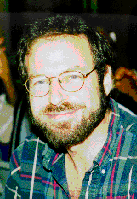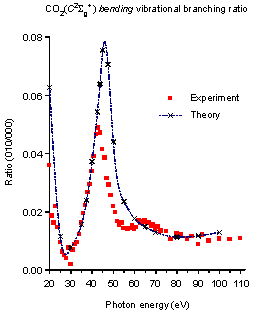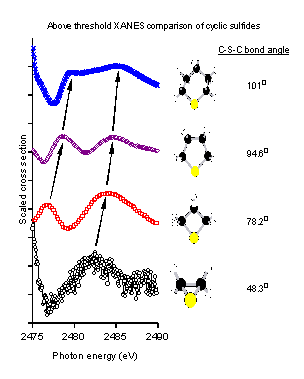Erwin Poliakoff

Emeritus Professor - Spectroscopy
Bachelor's Degree(s): UC Santa Barbara, 1975
PhD: UC Berkeley, 1979
Phone: (225) 578-2933
Fax: (225) 578-3458
E-mail: [email protected]
Office: 303 Choppin Hall
Area of Interest
My group performs research on molecular spectroscopy and we focus on experiments that reveal new connections between spectroscopy and structure. The work employs photons in the vacuum ultraviolet and x-ray regions. Two related areas are emphasized, namely, fundamental processes in small molecules, as well as developing structural information on more complex chemical species. For both types of studies, we employ molecular photoionization as a tool.
For the research on small gas-phase molecules, we examine the vibration and rotation of the ions formed as a function of the photoelectron kinetic energy. In particular, we study how the deposition of energy into the ion depends on the outgoing photoelectron kinetic energy. This requires tunable light at short wavelengths (i.e., l £ 50 nm), and dictates the use of synchrotron radiation. We make extensive use of CAMD, the LSU synchrotron radiation source, as well as the Advanced Light Source (ALS) at Berkeley. For some experiments, we create ions in excited states that fluoresce, and determine the deposition of energy into the ions using either fluorescence spectroscopy or photoelectron spectroscopy. An example is photoionization of CO2, where we have determined that the symmetry forbidden bending motion is not as prohibited as one might suppose. The results shown in Fig. 1 display the cross section for creating the ion with quantum of bending vibration (nominally forbidden) vs. the cross section for creating the ion with no vibrational excitation. The energy dependence of this branching ratio indicates that a dynamical symmetry-breaking phenomenon is occurring. The CO2 results highlight a central topic of our research, namely, developing experiments that amplify and elucidate the correlation of electronic and nuclear degrees of freedom.

There are several mechanisms that result in exchange of vibrational or rotational energy with electronic energy, such as shape resonances andCooper minima. For example, shape resonances occur when an outgoing electron is temporarily trapped in a quasibound state, and the nature of this quasibound state depends strongly on both photoelectron energy and molecular geometry.
The CO2 work is an example of our valence shell studies, and we also use higher energy photons, i.e., x-rays, to excite electrons from core orbitals, and this work is done on more complex systems. Much of this research is done in collaboration with Professor Robin McCarley. Many phenomena observed for valence electron ejection also occur when a core electron is ejected, and one has the additional advantage that the electron originates from a well-defined location in the molecule. Hence, it is possible to generate more detailed structural and chemical information via the x-ray spectroscopy experiments. Fig. 2 shows x-ray absorption spectra obtained for ejection of core electrons from the sulfur atom in a series of polymethylene sulfides. There are clear trends as the ring size is adjusted, reflecting the sensitivity of the photoelectron dynamics to the bond angle.

These examples show that photoionization is useful for highlighting connections between spectroscopy and structure. The observation that such spectra generate useful information for such different samples demonstrates that far-reaching insights can be uncovered from these studies.
Awards & Honors
Roy Paul Daniels Professor
Selected Publications
A. Das, J.S. Miller, E.D. Poliakoff, R.R. Lucchese, and J.D. Bozek. Vibrationally resolved photoionization dynamics of CF4 in the D2A1 state. J. Chem. Phys., 2007, 127, 044312
R. Montuoro, R.R. Lucchese, J.D. Bozek, A. Das, and E.D. Poliakoff. Quasibound continuum states in SiF4 D2A1 photoionization: Photoelectron-vibrational coupling. J. Chem. Phys., 2007, 126, 244309
A. Das, E.D. Poliakoff, R.R. Lucchese, and J.D. Bozek. Launching a particle on a ring: b2u -> ke2g ionization of C6F6. J. Chem. Phys., 2006, 125, 164316/1-4
E.D. Poliakoff and R.R. Lucchese. Evolution of photoelectron–vibrational coupling with molecular complexity. Physica Scripta, 2006, 74, C71-C79
G.J. Rathbone, E.D. Poliakoff, J.D. Bozek, R.R. Lucchese. Electronically forbidden (5su-> ksu) photoionization of CS2: Mode-specific electronic-vibrational coupling. J. Chem. Phys., 2005, 122, 064308
S.L. Alderman, G.R. Farquar, E.D. Poliakoff, and B. Dellinger. An infrared and x-ray spectroscopic study of the reactions of 2 chlorophenol, 1,2 dichlorobenzene, and chlorobenzene with model CuO/silica fly-ash surfaces. Environ. Sci. Technol., 2005, 39, 7396-7401
G.J. Rathbone, E.D. Poliakoff, J.D. Bozek, D. Toffoli, R.R. Lucchese. Photoelectron trapping in N2O 7s -> ks resonant ionization. J. Chem. Phys.,2005, 123, 014307/1-9
S.L. Alderman, George R. Farquar, E.D. Poliakoff, B. Dellinger. Reaction of 2-Chlorophenol with CuO: XANES and SEM Analysis. Proc. Comb. Inst.,2005, 30, 1255-1262
G.J. Rathbone and E.D. Poliakoff, J.D. Bozek, R.R. Lucchese. Intrachannel vibronic coupling in molecular photoionization. Canadian Journal of Chemistry, 2004, 82, 1043-1051
G.J. Rathbone, R.M. Rao, E. D. Poliakoff, K. Wang, V. McKoy. Vibrational branching ratios in photoionization of CO and N2. J. Chem. Phys., 2004, 120, 778
G.J. Rathbone, E.D. Poliakoff, J.D. Bozek, R.R. Lucchese, P. Lin. Mode-specific photoelectron scattering effects on CO2+(C-state) vibrations. J. Chem. Phys., 2004, 120, 612
G.J. Rathbone, E.D. Poliakoff, John D. Bozek, R.R. Lucchese. Observation of the symmetry-forbidden 5su -> ksu CS2 transition: A vibrationally driven photoionization resonanc. Physical Review Letters, 2004, 92, 1430021-1430024
E.E. Doomes, R.L. McCarley, E.D. Poliakoff. Correlations between heterocycle ring size and X-ray spectra. J. Chem. Phys., 2003, 119, 4399
G. Farquar, S.A. Alderman, E.D. Poliakoff, and B. Dellinger. X ray Spectroscopic Studies of the High Temperature Reduction of Cu(II)O by 2-Chlorophenol on a Simulated Fly-Ash Surface. Environ. Sci. Technol., 2003, 38, 931-935
E.E. Doomes, P.N. Floriano, R.W. Tittsworth, R.L. McCarley, and E.D. Poliakoff. Anomalous XANES spectra of octadecanethiol adsorbed on Ag(111). J. Phys. Chem. B, 2003, 107, 10193
J.S. Miller, E.D. Poliakoff, T.F. Miller, III, A.P.P. Natalense and R.R. Lucchese. Excitation of the Symmetry Forbidden Bending Mode in Molecular Photoionization. J. Chem. Phys., 2001, 114, 4496-4504
G.J. Rathbone, E.D. Poliakoff, J.D. Bozek and R.R. Lucchese. Resonantly Amplified Vibronic Symmetry Breaking. J. Chem. Phys., 2001, 114, 8240
G. Farquar, J.S. Miller, E.D. Poliakoff, K. Wang and V. McKoy. Rotationally Resolved Photoionization: Influence of the 4o-ko shape resonance on CO+ (B2E+) Rotational Distributions. J. Chem. Phys., 2001, 115, 9764-9770
P.N. Floriano, C.O. Noble, IV, J.M. Schoonmaker, E.D. Poliakoff and R.L. McCarley. Cu(0) Nanoclusters Derived from Poly(propylene imine) Dendrimer Complexes of Cu(II). J. Am. Chem. Soc., 2001, 123, 10545-10553
G.J. Rathbone, E.D. Poliakoff, J.D Bozek and R.R. Lucchese. Resonantly Amplified Vibronic Symmetry Breaking. J. Chem. Phys., 2001, 114, 8240
P.N. Floriano, O. Schlieben, E.E. Doomes, I. Klein, J. Janssen, J. Hormes, E.D. Poliakoff and R.L. McCarley. A Grazing Incidence X-ray Absorption Fine Structure (GIXAFS) Study of Alkanethiols Adsorbed on Au, Ag, and Cu. Chem. Phys. Lett., 2000, 321, 175-181
P.N. Floriano, O. Schlieben, E.E. Doomes, I. Klein, J. Janssen, J. Hormes, E.D. Poliakoff and R. L. McCarley. A Grazing Incidence X-ray Absorption Fine Structure (GIXAFS) Study of Alkanethiols Adsorbed on Au, Ag and Cu. Chem. Phys. Lett., 2000, 321, 175-181
J.S. Miller and E.D. Poliakoff. On the Correlation Between Photoelectron Energy and Bending Excitation in Molecular Photoionization. J. Chem. Phys., 2000, 113, 899
Former Ph. D. Students
J. Miller PhD,Air Force Research Lab, National Research Council
Chuanyung Wu PhD,Caliper Technologies (MEMS)
Sandeep Kakar PhD,Lucent Technology
Raj Rao PhD,Cymer, Inc.
Romith Das PhD,Deutsche Bank (Emerging Markets)